Mushrooms: A Key to Solving Global Challenges
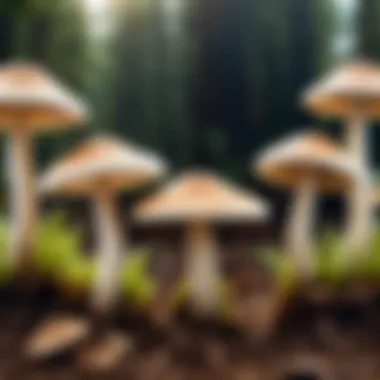

Intro
Mushrooms often get a bad rap, considered as a mere ingredient for culinary delights or an afterthought in many ecological discussions. However, these fascinating fungi possess capabilities that reach far beyond simple stir-fries or personal pizza toppings. They could, in fact, be one of nature's unsung heroes in tackling some of the pressing challenges we face today. In an era characterized by climate change, food security issues, and dwindling resources, the potential of mushrooms emerges as a beacon of hope.
By shedding light on the various roles that mushrooms play—from enhancing agricultural practices to contributing to medical breakthroughs—it is crucial to delve into mycology in a comprehensive manner. This is not just some academic fancy but a pressing need to integrate mushroom-based solutions into our daily practices. As the old saying goes, "What you sow is what you reap." The seeds of change could very well start with fungi.
In the upcoming sections, we will explore how mushrooms can transform our relationship with food, health, and the environment. So, let’s dive deep into their multifaceted roles, paving the way for innovative solutions that might just save the world.
The Role of Fungi in Ecosystems
Fungi, particularly mushrooms, hold a pivotal place in ecosystems that is often overlooked. Their role extends beyond just being a food source or a visual curiosity in the forest floor. They are integral players in the ecological web, fostering balances that sustain life itself. By contributing to nutrient cycles, forming complex relationships with plants, and serving as decomposers, fungi fortify the health of environments globally.
Understanding Mycelium Networks
At the heart of fungi's ecological relevance is the mycelium—an underground network of fungal threads known as hyphae. This extensive labyrinth functions akin to the internet of the soil. It connects different plants, allowing them to communicate and share resources, much like we exchange information through our gadgets.
When plants function in unison through mycelium networks, they can enhance nutrient uptake and support one another during stress, such as drought or disease. The mycelium effectively acts as a conduit, providing pathways for water and nutrients, while also facilitating the transfer of chemical signals. This interplay underscores the potency of mycelium in stabilizing ecosystems and showcases fungi's often unseen but crucial role in supporting plant life.
Symbiosis: Partnership with Plants
The partnership between fungi and plants is a beautiful example of mutualism, where both parties come out better off. Many plants, particularly trees, engage in a symbiotic relationship known as mycorrhiza, where fungal hyphae envelop the roots.
Through this alliance, fungi increase the surface area for absorption, allowing plants access to water and essential minerals like phosphorus and nitrogen, which might be otherwise out of reach. In exchange, plants provide fungi with carbohydrates produced through photosynthesis. This kind of synergy is not just beneficial; it is often essential for plant health and resilience.
Examples can be found everywhere: oak trees, for instance, thrive when associated with certain mushroom species, leading to stronger roots and healthier growth. This network of relationships culminates in improved biodiversity within the ecosystem, making it more robust against disruptions.
Nutrient Cycling and Soil Health
Mushrooms are critical players in nutrient cycling, acting as powerhouses of decomposition. They break down organic matter, transforming it from complex substances into simpler forms that can again be utilized by plants. A forest without fungi would quickly become overrun with undecomposed material—dead leaves, fallen trees, and animal remains. Fungi essentially act as recyclers.
This decomposition process enriches the soil, promoting fertility and ensuring sustainable growth for future generations of plants. Without fungi, nutrients would be locked away, lost in a cycle that doesn’t contribute toward the next wave of life. Moreover, healthy soil fostered by fungi leads to stronger crops, and thus, a more robust food supply.
"Fungi are not just decomposers; they are vital to the resilience and productivity of ecosystems."
In summary, the role of fungi in ecosystems is multifaceted and incredibly vital. Through mycelium networks, beneficial symbioses, and crucial involvement in nutrient cycling, fungi offer invaluable support to plant life and, by extension, to all living creatures that rely on those plants. Embracing the complexity of these relationships is essential as we aim to save our environment and, indeed, our world.
Mushrooms in Agriculture
Mushrooms are not just a culinary delight; they hold transformative powers that can reshape our agricultural landscape. They offer numerous benefits that contribute to the sustainability and productivity of farms worldwide. From natural pest control to enhancing soil health, mushrooms are becoming increasingly recognized as indispensable partners in cultivating crops. Their unique properties allow for more holistic farming practices that align with the growing demand for environmentally-friendly approaches.
Natural Pest Control Solutions
Instead of reaching for toxic pesticides that can cause lasting harm to ecosystems, more farmers are turning to fungi for pest control. Certain mushrooms, like the Entomopathogenic fungi, produce spores that target specific pests—think of them as fungal assassins. Their life cycles disrupt the reproduction and growth of harmful pests, naturally keeping their numbers in check without the collateral damage associated with conventional chemicals. This method not only protects crops but also promotes a healthier soil ecosystem.
- Benefits include:
- Reduced reliance on chemical pesticides
- Protection of beneficial insects
- Maintaining overall biodiversity in planting areas
"Mushrooms stand as a testament to nature's ingenuity; what harms one creature can nurture another."
By introducing these fungal allies into agricultural systems, farmers are paving the way for more sustainable and resilient practices.
Mycoremediation: Detoxifying Polluted Soil
Mushrooms possess an uncanny ability to break down and absorb toxic substances in the soil, a process known as mycoremediation. This is especially vital in areas battered by industrial farming or pollution from various sources. Species like Pleurotus ostreatus, commonly known as oyster mushrooms, have demonstrated efficiency at degrading contaminants such as heavy metals and petroleum-based products.
- How it works:
- Mycelium spreads through the soil, acting as a sponge
- Decomposes harmful compounds, making them less toxic
- Enhances nutrient availability in previously marginalized lands
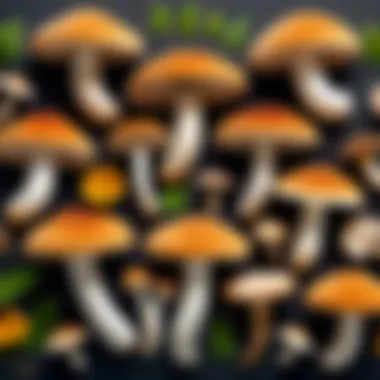
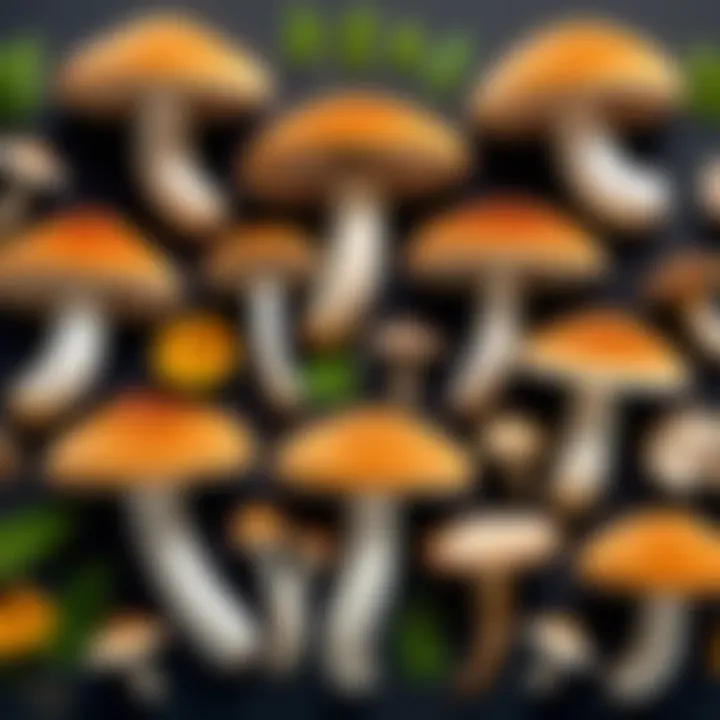
The implementation of these fungi not only revitalizes barren landscapes but also creates a healthier environment for future crops. It's a win-win that turns the tide against years of chemical misuse.
Enhancing Crop Yield and Quality
Integrating mushrooms into conventional farming can lead to impressively increased crop yield and quality. Fungi form symbiotic relationships with plants, extending their root systems through mycorrhizal associations. This partnership enhances nutrient absorption dramatically. When plants thrive, so do farmers.
- Key advantages include:
- Improved water retention in the soil
- Enhanced nutrient uptake, especially phosphorus and nitrogen
- Increased resilience against disease and extreme weather
Farmers experimenting with these techniques have reported higher yields and, importantly, a reduction in the use of synthetic fertilizers. This evokes a sustainable cycle of growth where both the soil and crops flourish, making it clear that mushrooms could play a central role in the future of agricultural practices.
Medical Applications of Mushrooms
Mushrooms are not just a culinary delight; they are emerging as powerhouses in the medical field. Understanding their medical applications sheds light on the potential they have in transforming healthcare systems. As drug resistance becomes a growing concern, the innate properties of mushrooms offer new avenues for innovation. They have demonstrated abilities to address infections, combat serious diseases like cancer, and improve mental health, making them crucial in today’s health landscape.
Antimicrobial Properties
One of the key benefits of mushrooms lies in their antimicrobial properties. Certain types of fungi, such as Penicillium and Ganoderma lucidum, produce compounds which resist bacterial growth. This aspect of mushrooms has gained attention as an alternative to conventional antibiotics, particularly with the rise in antibiotic resistance. Imagine a world where common infections don’t lead to complex treatments – mushrooms might pave that way.
In fact, studies indicate that extracts from mushrooms can inhibit the growth of harmful bacteria, such as E. coli and Staphylococcus aureus. This suggests their use in treating infections could not only be effective but also a safer choice in some cases. Incorporating fungi into medicine could lead to powerful products that protect public health while minimizing side effects associated with synthetic antibiotics.
"Mushrooms might just hold the key to combating our creeping crisis of antibiotic resistance."
Cancer Treatment Innovations
Delving deeper, we find that mushrooms may hold promise in cancer treatment innovations. The bioactive compounds within certain species, like Trametes versicolor, exhibit anti-tumor properties. These compounds work by enhancing the immune response and inhibiting tumor growth. Researchers are actively investigating various mushrooms, hoping to integrate their extracts into cancer therapies.
Notably, the polysaccharides in mushrooms like shiitake and maitake have shown potential in clinical trials, enhancing the effectiveness of chemotherapy drugs. Combining traditional therapies with derivatives from fungi might optimize treatment routines for patients, targeting cancer cells more effectively while reducing toxicity associated with conventional medications.
Psychedelic Research and Mental Health
Another groundbreaking area is the research into psychedelic effects of certain mushrooms. Specifically, psilocybin-containing mushrooms have gained traction in clinical settings for their effects on mental health conditions. Initial studies highlight how these substances can alleviate symptoms of depression, anxiety, and PTSD. The results suggest that a single dose of psilocybin can lead to lasting changes in mood and perspective, demonstrating how the mind can be influenced positively through nature’s bounty.
The understanding here is evolving, as mental health disorders become increasingly prevalent. By exploring how psychedelics can fundamentally shift emotional well-being, researchers are peering into the future of mental health treatment. This path could lead to new therapies that challenge traditional therapeutic methods, opening up a realm of possibility in psychological interventions.
Environmental Impact of Fungi
The role fungi play in environmental sustainability cannot be overstated. As unassuming as they might appear, mushrooms and their mycelial networks hold the keys to several ecological challenges we face today. By emphasizing the multifaceted benefits that fungi bring to ecosystems, this section aims to illuminate how integrating fungi into our environmental strategies can yield significant improvements in biodiversity, carbon sequestration, and waste management.
Biodiversity Promotion through Fungal Cultivation
Biodiversity is the cornerstone of environmental resilience, and fungal cultivation can be a remarkable ally in maintaining it. Fungi create intricate relationships within their ecosystems, acting as catalysts for species interactions and promoting plant diversity. When we cultivate mushrooms, we are not merely growing a food source; we’re actively enhancing the ecosystem.
Many mushrooms form symbiotic relationships with plants, particularly through mycorrhizal associations. Specifically, fungi extend their hyphae into the soil, effectively increasing nutrient absorption for trees and other plants. In return, these plants provide carbohydrates to the fungi. This partnership leads to healthier forests and grasslands that are capable of sustaining diverse wildlife populations. Not only does this improve soil health, but it also helps in fighting issues like soil erosion and nutrient depletion.
Moreover, the cultivation of diverse fungal species can lead to the restoration of degraded environments. For instance, Pleurotus ostreatus, commonly known as the oyster mushroom, has demonstrated the ability to revive barren land, making it fertile again and allowing various native plants to thrive. This, in turn, helps create habitats for numerous insects, birds, and small mammals.
Mushrooms as Carbon Sinks
In the current climate crisis, finding effective carbon sequestration strategies has become paramount. Fungal species play a significant role in capturing carbon from the atmosphere. Through their growth, mushrooms absorb CO2 and help in building organic matter in soils. This process intensifies with the decay and decomposition of fungi, which contributes to soil carbon storage.
Mushrooms like Lentinula edodes, better known as shiitake, have been researched for their abilities to sequester more carbon than traditional crops. Studies indicate that well-managed mushroom farming not only captures more carbon but also enhances soil structure. The mycelium binds soil particles together, leading to improved soil quality and higher resilience against climate extremes.
"Mushrooms are not just food, they are vital players in our ecosystem's climate strategies."
This aspect of mushrooms highlights their potential in climate action plans and carbon offset programs. By turning favoritism towards mushroom cultivation, not only can we combat climate change but we can create sustainable agricultural practices.
Decomposition and Waste Reduction
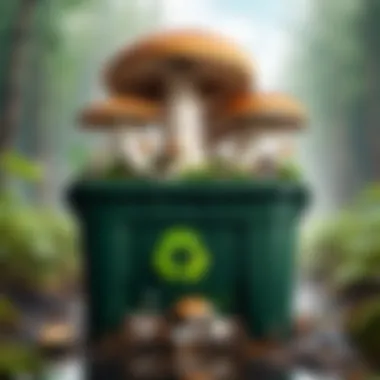

Fungi are nature's recyclers. Their unique enzymatic systems enable them to break down tough organic materials, such as lignin and cellulose found in plant matter. This decomposition process is crucial for nutrient cycling, ensuring that the essential elements are returned to the ecosystem rather than being locked away in waste.
Many waste reduction initiatives have harnessed the power of mushrooms to process agricultural or forestry waste. Using certain fungal species, such as Ganoderma lucidum, waste products can be effectively transformed into valuable compost or bio-fertilizers. This not only reduces landfill use but also improves soil fertility.
Additionally, mushrooms can help in bioremediation efforts by degrading pollutants in contaminated soils. For instance, Pleurotus ostreatus has shown efficacy in breaking down plastics, converting harmful substances into harmless by-products. This capability positions fungi as promising agents in efforts aimed at mitigating pollution and fostering a circular economy.
As we face pressing environmental challenges, it becomes clear that fungi are more than just simple organisms; they are vital players in promoting ecological stability, capturing carbon, and reducing waste. By embracing the potential of mushrooms and their ecological roles, we can chart a more sustainable path forward.
Mushrooms in Biotechnology
Mushrooms are not just a feast for the eyes or taste buds; they play an essential role in biotechnology by providing numerous applications that can transform industries and tackle pressing environmental issues. Their unique properties, derived from their biological makeup, offer innovative solutions that go beyond traditional methods. As the world grapples with various ecological and health challenges, leveraging the power of fungi becomes increasingly vital. Different aspects related to mushrooms' role in biotechnology can be explored, highlighting benefits, challenges, and the future potential they hold.
Fungal Enzymes in Industrial Processes
Fungal enzymes are powerhouses in various industrial processes. To put it simply, they help break down complex substances, making them easier to digest, so to say. Enzymes from mushrooms, like laccases and cellulases, facilitate chemical reactions that would otherwise require harsh conditions or toxic chemicals. This ability to operate under milder conditions presents a dual benefit: reducing energy consumption and minimizing environmental harm.
One fascinating application can be seen in the textile industry. Using fungal enzymes to treat fabrics can lead to less water usage and fewer harmful byproducts. This not only conserves resources but also makes processes safer for workers. Additionally, in food production, certain enzymes derived from fungi assist in maximizing yields by enhancing the fermentation processes, improving flavors, and even extending shelf life.
"Utilizing fungal enzymes not only improves efficiency but also aligns industrial goals with sustainability."
The importance of these enzymes cannot be overstated. Infact, industries stand to gain more than just financial benefits; they can also contribute significantly to environmental conservation.
Mycelium as a Sustainable Packaging Material
Mycelium, the vegetative part of fungi, is turning heads in the realm of sustainable packaging. Unlike conventional materials, mycelium is biodegradable, meaning it doesn’t contribute to the growing mountains of waste that plague the planet. Imagine packaging that decomposes and nourishes the earth while protecting the product inside – that’s mycelium for you.
Companies are now harnessing the potential of mycelium to create alternative materials that are robust yet eco-friendly. Brands have begun to explore its use in various packaging applications, from cushioning fragile objects to creating innovative containers. This could potentially reduce the reliance on plastics, which are notorious for their lengthy decomposition times. Not only is it an ecological win, but marketing a product with sustainable packaging can also resonate well with consumers who are increasingly conscious of their environmental impact.
Biodegradable Alternatives to Plastics
The mushroom kingdom extends its benevolence to biodegradable alternatives to conventional plastics. As research progresses, various researchers and companies are experimenting with fungi-based materials that break down much quicker than their petroleum-based counterparts. For instance, products made from fungal mycelium can decompose in just a few weeks instead of the hundreds of years typical for plastic.
This shift toward embracing fungal materials could change the landscape of consumer goods and even reshape regulatory frameworks surrounding waste disposal. Imagine the potential reduction in marine pollution and landfill overflow if common packaging materials were designed to decompose thoroughly without leaving toxic residues.
Here are some reasons to consider fungi as a viable alternative to plastics:
- Non-Toxic: Mushrooms and their byproducts are safe for both humans and the environment.
- Versatile Applications: Fungi-derived materials can cater to a variety of industries, such as food, cosmetics, and electronics.
- Resource Efficiency: Cultivating fungi requires far fewer resources than producing synthetic plastics.
As we steer toward more sustainable practices, mycelium and other fungal materials present an exciting frontier in the fight against plastic waste.
Cultural Significance of Mushrooms
The cultural importance of mushrooms extends far beyond their culinary and medicinal uses. Across various societies and eras, mushrooms have served as a symbol of nourishment, spirituality, and ecological awareness. They have woven themselves into the fabric of folklore and tradition, reflecting a deep connection between people and nature. This deep-rooted relationship is not just a matter of dietary preference; it encapsulates the benefits we derive from mushrooms as a critical element of ecosystems and human culture.
Many communities around the globe have historical practices that revolve around mushrooms. They are often celebrated in rites, festivals, and traditions. For example, in some Indigenous cultures, mushrooms hold a sacred status, believed to be gifts from the earth that can facilitate communication with ancestral spirits. This illustrates how mushrooms are viewed not merely as food sources but as entities worthy of respect, embodying the interconnectedness of life itself.
In the field of traditional medicine, mushrooms have long been used as therapeutic agents. Historical records from ancient civilizations, such as the Chinese, show that certain mushrooms were revered for their healing properties. Take the Reishi mushroom, which has been valued for over two millennia for boosting immunity and promoting longevity. Cultivating an understanding of these ancient practices can offer modern society insight into holistic health approaches and complementary therapies.
As the saying goes, "From little things, big things grow." This is especially true for how we might approach our understanding of mushrooms—they may be small, but their impact is profound.
Moreover, culinary diversity showcases the scope of mushrooms’ contributions to culture. Varieties like shiitake and portobello have given rise to innovative dishes worldwide. Different regions embrace unique flavors and textures, leading to a global appreciation of culinary possibilities. Chefs are increasingly showcasing mushrooms in sophisticated ways, often turning them into the centerpiece of dishes, highlighting their versatility and rich umami flavors. This not only elevates mushrooms on the dining table but also underlines their economic potential in a burgeoning gastronomic scene.
The economic implications of mushrooms now cannot be overlooked. As urban farming and foraging gain popularity, the market for mushrooms is expanding rapidly. People are venturing into small-scale mushroom farming, either for personal consumption or to meet growing local demand. Even amongst gadget lovers, there are specialized kits available for home cultivation—it’s a blend of technology and nature that appeals to their desire for fresh, quality produce while minimizing their ecological footprint.
In summary, the cultural significance of mushrooms provides layers of richness and insight into their diverse roles in human life. They are more than mere organisms in the environment; they are a bridge between medicine, cuisine, tradition, and economic opportunities. Their historical context and contemporary relevance underscore why embracing mushrooms may be vital in addressing both personal and global challenges.
Challenges and Controversies
The discussion surrounding mushrooms isn't all rainbows and sunshine. While they harbor the potential to transform agriculture, medicine, and the environment, several challenges and controversies cast a long shadow over these benefits. It’s crucial to dissect these issues to foster a nuanced understanding of the implications of mycological practices. In particular, the topics of toxicity and risks in identification, along with the problems related to overharvesting, highlight not just the complexity of our relationship with fungi but also the responsibility that comes with it.
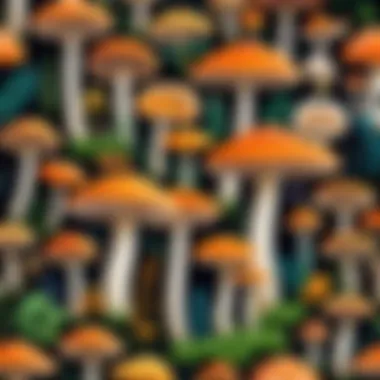

Toxicity and Identification Risks
Though mushrooms can provide tremendous benefits, they also carry inherent risks, especially concerning toxicity. Many edible fungi have toxic lookalikes that can cause serious health issues. A prime example is the death cap mushroom (Amanita phalloides), often mistaken for harmless varieties. This potential for misidentification is not something to take lightly, as it has led to numerous poisonings and fatalities around the world.
Educating the public about mushroom identification is imperative. Simple guidelines to prevent toxic encounters include:
- Learning to identify key characteristics of edible species.
- Joining local mycology groups for expert guidance.
- Participating in foraging workshops led by experienced mycologists.
Misidentification doesn’t only threaten individual safety; it undermines trust in the use of fungi in healthcare and agriculture. Rigorous research and training programs are necessary to create confidence in foraging as a viable and safe alternative for sourcing food and medicine.
Overharvesting and Sustainable Practices
As the fascination with mushrooms grows, so does the risk of overharvesting, which poses a significant threat to wild populations. Unsustainable harvesting can lead to the depletion of vital mushroom species, negatively impacting ecosystem balance. For instance, certain truffle species, revered for their culinary value, are now endangered in some regions due to excessive picking.
To address this issue, it's essential to integrate sustainable practices into mushroom foraging and cultivation. Some vital strategies include:
- Promoting responsible foraging: Capping the quantity that can be harvested, allowing wild populations to regenerate each season.
- Cultivating educational programs: Raising awareness about the ecological roles of fungi and the significance of protecting native species.
- Encouraging community initiatives: Such as local farming and cultivation efforts that align with environmental sustainability principles.
The interplay between the growing interest in mushrooms and the ecological risks they face serves as a reminder that our choices have consequences. By taking a proactive approach and advocating for sustainable practices, we can protect these vital organisms while still enjoying their myriad benefits.
"Understanding the challenges ensures that the conversation about mushrooms remains balanced and feasible for our future."
By addressing both the risks related to toxicity and the threat of overharvesting, we can pave a thoughtful way forward. Embracing mushrooms in our societies requires a commitment not just to their benefits, but also to the ethical considerations surrounding their use.
Future Directions and Potential Innovations
As we forge ahead into a world marked by both opportunities and challenges, the potential of mushrooms may serve as an underappreciated yet critical factor in carving out innovative solutions. This segment delves into future directions and potential innovations surrounding fungi, underscoring their transformative capabilities in various domains. By embracing mycological advancements, society can tap into their extensive range of benefits that could address pressing global concerns such as climate change, food security, and public health.
Collaborative Research Initiatives
Collaborative research involving interdisciplinary teams is essential for unlocking the full potential of mushrooms in combating contemporary issues. Academic institutions, private sector innovators, and grassroots organizations must come together to share knowledge and resources. Their joint efforts can lead to the development of cutting-edge applications and technologies. A notable example is the collaboration between universities and agricultural companies to enhance mycoremediation techniques for cleaning up polluted environments.
Key factors that require cooperation include:
- Interdisciplinary Approach: Combining mycology with fields such as biotechnology, environmental science, and health can produce holistic solutions.
- Funding and Grants: Greater investment in fungal research, such as through government grants or private sponsorships, can escalate innovation.
- Global Collaboration: Forming international partnerships can enable researchers to share findings and techniques, creating a richer understanding of fungi across various landscapes.
"Collaboration transcends individual capabilities, paving a path toward collective progress in science and sustainability."
Engaging in these initiatives can facilitate the dissemination of knowledge, leading to innovative applications of mushrooms in society, from enhanced sustainable practices in agriculture to novel approaches in health care.
Education and Public Awareness
Raising public awareness and fostering education about the power of mushrooms is a crucial cornerstone for ensuring these innovations gain traction. The general populace often views mushrooms through a narrow lens, usually regarding them only as food sources or occasional curiosities. Thus, initiatives aimed at enlightening the public can highlight the myriad ways mushrooms can improve our world.
Implementing educational programs can encompass the following:
- Community Workshops: Organizing events focused on mushroom cultivation, identification, and their ecological benefits fosters hands-on learning.
- Online Courses and Webinars: Accessible online platforms can educate a wider audience about mycology and its applications in sustainability.
- Social Media Campaigns: Utilizing social media to spread knowledge about the benefits of mushrooms can engage a broader audience. For example, platforms like Facebook or Reddit can create spaces for discussions, thus promoting a culture of sharing information.
By prioritizing education and awareness, we ensure that future generations not only recognize the benefits of mushrooms but actively participate in fostering their growth and application within society.
Closure: Understanding Mushrooms' Role in a Sustainable Future
Mushrooms are not just a culinary delight; they hold the potential to transform our approach to sustainability. Their influence stretches across diverse fields such as agriculture, medicine, and environmental science, making them integral to a more sustainable future. Understanding this role is crucial, as it reveals both the benefits and considerations that come with integrating fungi into various systems.
One primary aspect is agricultural enhancement. By employing fungi in farming practices, we can promote natural pest control methods while increasing soil health. This fosters a healthier ecosystem, ultimately leading to higher yields and better quality crops. It's a win-win; farmers can reduce their reliance on chemical pesticides and fertilizers, which in turn minimizes ecological damage.
Furthermore, the bioremediation potential of mushrooms showcases their remarkable ability to break down pollutants. In a world rife with contaminated lands, this power becomes invaluable. The ability of certain fungi to detoxify soil not only makes previously unviable lands farmable again but also plays a part in enriching local biodiversity.
Mushrooms also take center stage in medicine. Their various compounds have shown promise in treating ailments ranging from infections to cancer, and even offering mental health solutions through psychedelic research. This innovative area signals a shift in how we perceive treatments, highlighting mushrooms as not merely an alternative but a powerful resource in modern medicine.
Socially, mushrooms bear cultural significance too. They vary widely among cuisines, and their economic potential leads to local growth and development. The resulting boost to local economies can be seen as vital, especially in areas that rely heavily on agriculture and natural resources.
"The roots of mushrooms weave in ways that deepen our connection to the environment, ensuring that a sustainable future is not just a dream but a possibility."
Despite their countless advantages, we must navigate the challenges mushrooms present. From identifying toxic varieties to ensuring sustainable harvesting, it’s paramount that education and awareness form the backbone of our efforts. The dangers lie not in the mushrooms themselves but in our approach to understanding and utilizing them.







